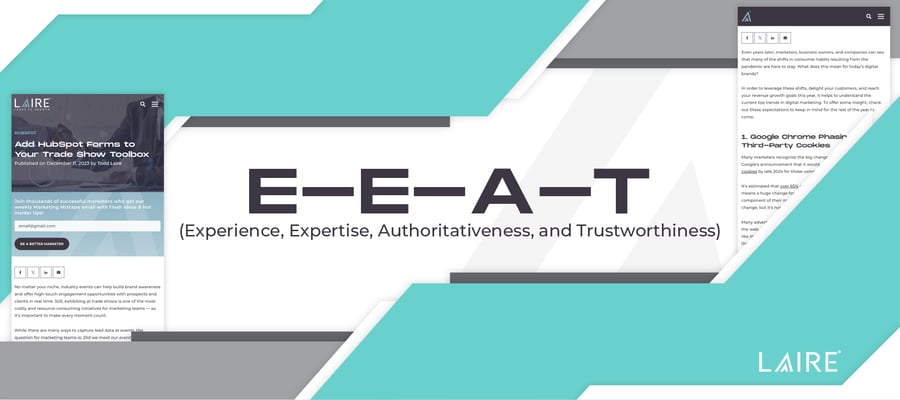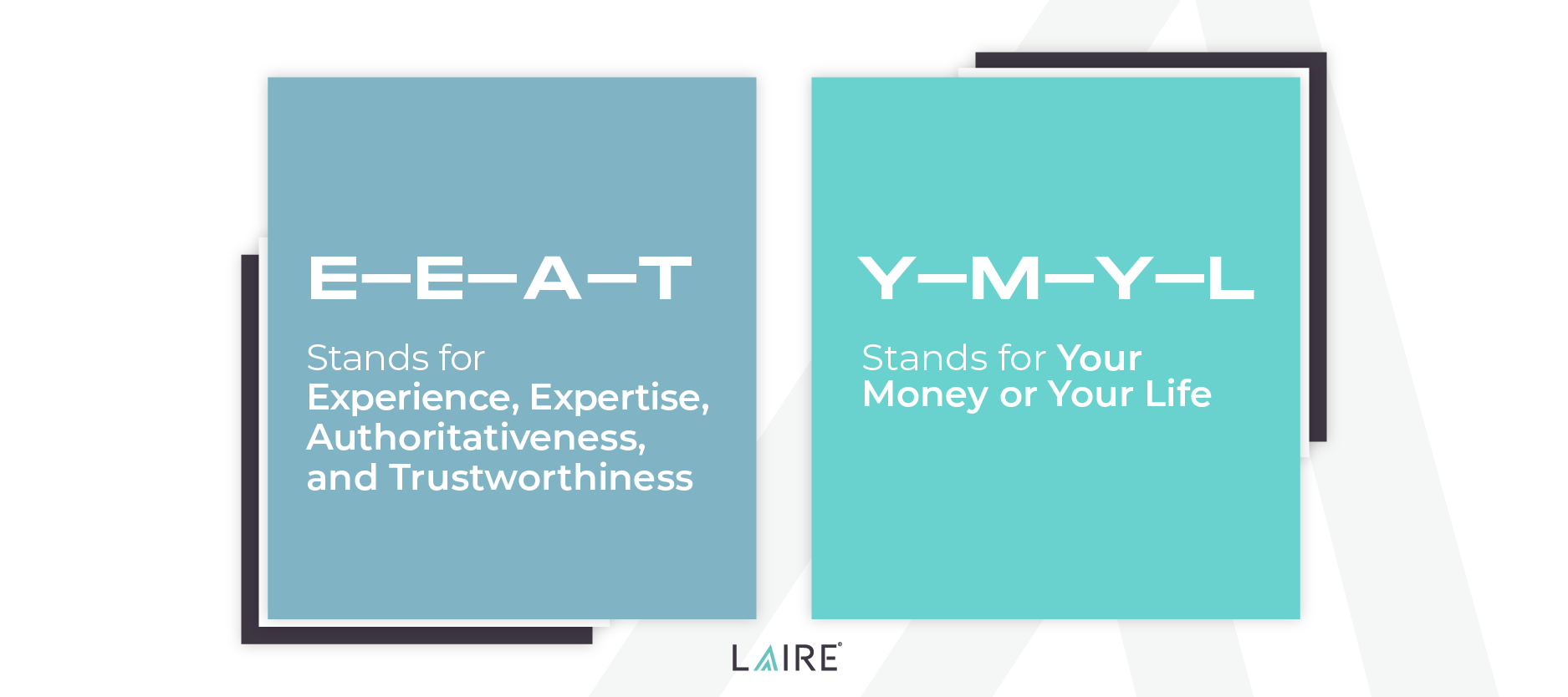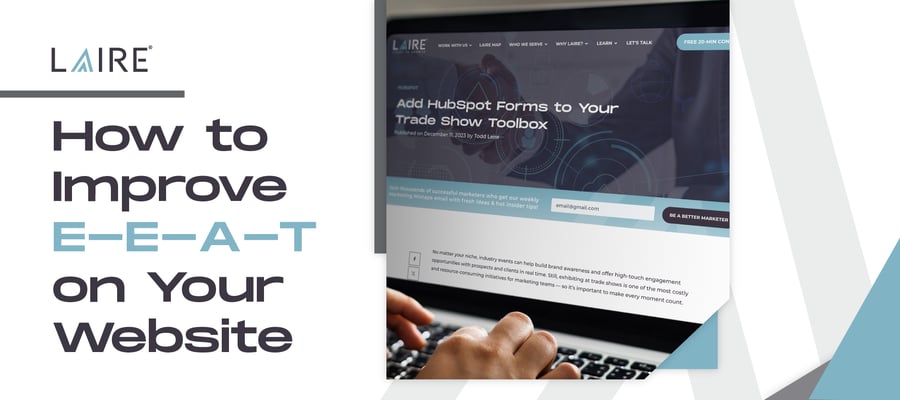Achieving high search engine rankings requires more than just using strategic keywords and acquiring backlinks.
Enter E-E-A-T (Experience, Expertise, Authoritativeness, and Trustworthiness).
As part of Google’s Search Quality Evaluator Guidelines (SQEG), it’s not a ranking factor but an aspect that helps Quality Raters determine whether search engine results are giving high-quality, relevant findings.
Incorporating Google E-E-A-T guidelines while creating content can help you better align with Google’s standards for quality and relevance and help your website rank better in search engine results.
Let’s dive in and discover how to improve E-E-A-T on your website to knock your search engine optimization (SEO) out of the park.
What Is E-E-A-T?

Search engines employ advanced algorithms to rank content based on E-E-A-T for SEO. What does E-E-A-T stand for? Experience, Expertise, Authoritativeness, and Trustworthiness.
Quality content aspects, such as relevance, accuracy, and user-friendly design, play an important role in this evaluation process. Algorithms look for content that showcases in-depth research, industry-specific language, and a consistent history of producing authoritative content.
Let’s dig in a little deeper and uncover exactly what each aspect entails.
Experience
The experience pillar of E-E-A-T centers on a website's overall user experience as it relates to user satisfaction and engagement.
A fast-loading site, intuitive navigation, and engaging design contribute to a favorable user experience that encourages repeat website visits and longer session durations. This pillar is crucial for search engines, as it indicates that a website values its visitors.
For example, let’s say you own a veterinary clinic, with a website that features pet health and wellness information via blogs, case studies, and content offers.
When you prioritize user-friendly features like an easily navigable interface, quick access to relevant information, and interactive tools for pet owners, it creates a positive experience for your visitors, in turn, helping increase your traffic and session times.
Expertise
Expertise focuses on the proficiency and knowledge of a specific subject provided through the website content. Demonstrating expertise involves showcasing in-depth research, publishing industry-related information, and presenting that information with authority. Examples of expertise include:
- In-depth research articles
- Authoritative whitepapers
- Webinars and expert interviews showcasing industry knowledge
- Content offers and downloads offering value to your visitor
Authoritativeness
Authoritativeness emphasizes the credibility and influence of your brand and website. Using authoritative sources, citations, and references in your content reinforces credibility and positions you as a thought leader within your industry.
By building authority, you provide original insights that contribute to your industry's base of knowledge. Tips for increasing authoritativeness include:
- Citing reputable sources to support claims
- Creating thought-provoking, original content
- Developing strategic partnerships and collaborations
- Regularly contributing to industry discussions and forums
Trustworthiness
Trustworthiness is built through being transparent, honest, and reliable. Your website should follow guidelines for posting trustworthy content that provides clear information, cites sources, and stays honest about any affiliations or partnerships.
Leveraging testimonials and Google reviews is another excellent way to showcase the trust you’ve gained from your community. Adding in case studies and real-world examples of your achievements also enhances your overall authority. Tips for building trustworthiness include:
- Clearly citing your sources and references
- Disclosing any affiliations and sponsorships
- Regularly updating and fact-checking your content
By understanding and implementing these pillars, you can better align with Google's E-E-A-T guidelines and enhance the overall quality and impact of your content. This way, you position your brand as a reliable source of information and a thought leader within your industry.
E-E-A-T and YMYL

Another term you need to get familiar with is YMYL. This stands for "Your Money or Your Life" (YMYL) and is a classification Google uses for websites that can significantly impact the financial stability, health, or overall well-being of its visitors. Websites fall into this category if they provide financial advice, medical information, or legal guidance.
YMYL content is always held to higher E-E-A-T standards due to the potential consequences of misinformation and inaccuracies that could significantly impact an individual's future happiness, health, financial stability, or safety.
That said, search engines prioritize delivering valuable, accurate content to all users. While YMYL websites do have a higher responsibility due to the potential impact they have on people’s lives, any website that wants to provide helpful and reliable information should prioritize E-E-A-T principles.
Adhering to E-E-A-T principles allows you to deliver content that stands out for its quality and reliability. It's not just about meeting Google's standards; it's about establishing a lasting online presence that’s built on trust. This, in turn, can positively influence your search rankings and user engagement.
How to Improve E-E-A-T on Your Website

Create High-Quality, Relevant Content
Ensure that your content reflects expertise in your field, demonstrating a deep understanding of the subject matter. This can be achieved by conducting thorough research, citing reputable sources, and presenting information clearly and comprehensively.
Establishing authoritativeness involves showcasing the credentials and experience of your content creators, such as experts, professionals, or individuals with relevant expertise. Additionally, maintaining trustworthiness requires transparency in your content, providing accurate and up-to-date information.
Refresh Your Content Over Time
Regularly updating your content to align with changes and developments in your industry shows your ongoing commitment and expertise and keeps your website relevant to what your target audience is searching for.
Ensure a User-Friendly Design
Make your website visually appealing and easy to navigate no matter what device visitors are using. Implementing more infographics, videos, and compelling images can all contribute to a more enjoyable experience for your audience.
Optimize Page Speeds
Improve your page loading times to encourage visitors to navigate your site easily. There’s nothing more frustrating than slowed-down speeds that affect usability.
Use Backlinks
A quick refresh on backlinks: Essentially, they’re hyperlinks that one website uses to link back to another website. They are an important part of SEO, as search engines often consider the quantity and quality of backlinks to assess a website's authority and relevance.
Make sure to build a strong backlink profile by using high-quality, relevant links from authoritative sources within your industry.
Embracing E-E-A-T for Maximum SEO Impact
To recap, E-E-A-T is simply a component of Google's Search Quality Rater Guidelines, which is a handbook used by Quality Raters to help them assess the effectiveness of Google's algorithm updates.
While E-E-A-T itself is not a direct factor influencing search engine rankings, Google still strives to deliver results aligned with strong E-E-A-T signals. This is an important concept for SEO because it guides content creators to prioritize user-centric and reliable content that meets Google’s standards and also establishes a foundation of credibility and trust with users.
It’s also important to note that search engines regularly refine their algorithms and introduce new criteria for ranking factors. Staying ahead of these changes means staying informed about the latest SEO trends and consistently refining your content.


